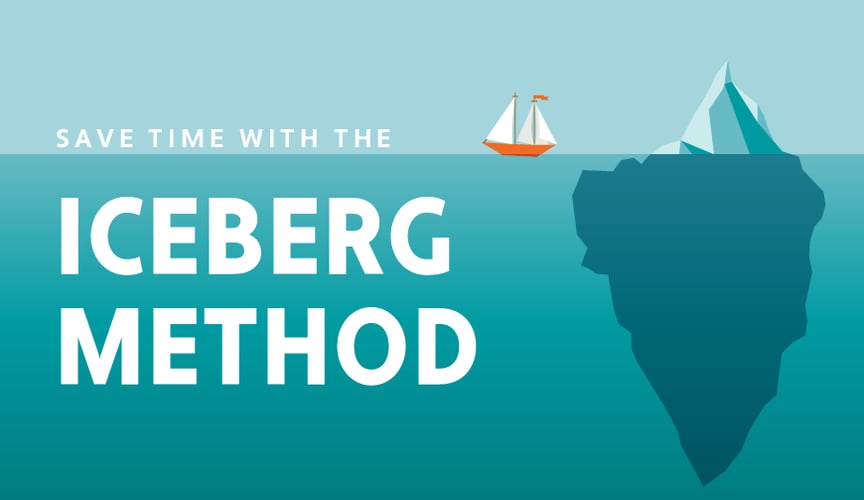Have you ever found yourself wishing you had saved some information such as an article or tip that you didn’t need when you first discovered it, only to spend hours searching for it when you did need it later?
Never Lose the Information You Need
You search your bookmarks, browsing history, and deleted emails—desperate to find the link, the article, the message that would help right now, but can’t find it. Ugh.
The Iceberg Productivity Method can help you avoid such situations by creating a process to save nuggets of valuable information as you discover them, making it easy to find them when you need them.
Save Everything Just in Case
It’s a kind of digital version of the idea behind Donald Hall’s memoir of life of his depression-era grandparents’ farm, “String Too Short to Be Saved.” The title refers to everything his grandmother had saved and categorized in boxes, in case she might need it someday, which included string not worth saving, but she kept anyway!
Motivational speaker Ramit Sethi of I Will Teach You To Be Rich created the Iceberg Productivity Method for just this kind of situation. It’s pretty simple. You set up email folders for categorizing and storing information you find valuable but don’t plan to use immediately. Examples Sethi provides include:
- Folders named after cities, with emails from people he might want when traveling there. Then, on his way, he could review the folder for that destination.
- Folders for skills he might need in the future, such as “How to create a great webinar,” because he might want to start a webinar program.
- Folders about topics where he can store insights for a blog topic he plans to write about in the future, such as “how to understand cryptocurrency.”
- Sethi also recommends that you review your folders every six weeks to see if you’ve forgotten something that could be very useful right now.
Keep It All in One Place
The goal is to take a few seconds today to save something that otherwise may take you hours to find when you need it. If the item didn’t come in the form of an email, you can paste a link in a blank email, send it to yourself, and store it accordingly. Your inbox becomes the tip of the iceberg, where you see one-third of your information repository. The rest is hidden from view, but there when you need it.
Other examples of valuable folders that might be useful include:
- Travel—save your flight, hotel, and car reservations in one folder. The most recent will always be at the top.
- Receipts—keep your online receipts together to make expense reports a lot easier.
- Donations—donation receipts are different than expense account receipts and keeping donation receipts in a separate folder can make it easier to find them come tax time.
Be Specific with Folder Types
Of course, the Iceberg Productivity Method doesn’t have to be limited to email folders. You can use file folders to save emails and other static documents like PDFs and image files. The point is to keep everything in one place and organize it all so that things are easy to find. This means you’ll want to make your folder names as specific as possible and why, for example, it is helpful to keep tax-deductible donation receipts separate from expense receipts. You don’t want to have to fish through a general receipts folder to pull your donations.
Finding the Time to Organize
One of the biggest reasons we don’t organize around our future needs is that it takes time, we’re busy, and there are a hundred other things to do. Why do today what you can put off until tomorrow, after all. One way to have the best of both worlds is to use a virtual assistant to build your iceberg for you.
Recommended Reading:
How to Avoid Wasting Time with Time Management
Get Organized with a Virtual Assistant
Instead of organizing your information yourself, you can send emails, files, and links to a virtual assistant that can store, manage and retrieve it for you when you need it. A virtual assistant can be a great partner in your organization's efforts.
But that’s just the tip of the iceberg (you know that was coming, didn’t you?) of what a virtual assistant can do and how one can save you time.
An assistant can take on other mundane but time-consuming tasks like:
- Managing your inbox
- Making calls
- Scheduling meetings
- Keeping you on schedule
The best assistants can perform even higher-level services like managing CRMs, running email campaigns, and following up on sales leads. You get to spend more time on what you got into business for in the first place, delivering great products and services that delight customers and grow your revenue.
To learn more about how a virtual assistant can give you more leverage and boost your productivity, read our guide to working with a Prialto VA.
